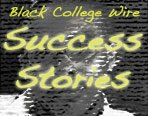| Howard Students Tackle Stereotypes |  |
 |
 |
| By Simone Pringle - Black College Wire | |
|
Bolanle Salaam remembers growing up and sometimes feeling insulted as an African. Salaam, the daughter of Nigerian immigrants, has dealt with stereotypes her entire life. 
Howard University International Pals
Bolanle Salaam
"A student I knew was told that he should listen to African music because it was where all music came from. He replied that he tried to listen to it, but all African music sounded like 'boom badda boom,' just random drum noises," said Salaam, a sophomore mathematics major. "I don't think I've ever been so offended in all my life. We need to cut that out. It's nonsense." Since slavery, there has been a great divide between Africans and their American counterparts. Some African students at Howard often feel stereotyped and mistreated based on misconceptions about their nationality and ethnicity. Having had similar experiences, junior nursing major and Liberian American Whennah Andrews said, "When I was younger, I can admit that I did feel embarrassed about being African mainly because at that stage of my life, I was really concerned about gaining social acceptance. I believe that is what some students who are first generation African American feel or felt. They feel that the opinions and standards set by their American counterparts are far more superior [to] their ethnic upbringing." Visiting assistant professor in the African studies department Msia Kibona Clark said that African-American students seem to have many incorrect ideas about African students. She said, "[Generally, students think] Africans are backwards, that they're coming from poor countries, that all Africans are poor. [Some African-American] students question the presence of big cities [in African nations.] They think that all Africans come from a village. [Many Americans] treat Africa as a country rather than a continent. One of the biggest [misconceptions] is all Africans are the same, that they all speak one language." Many students agree with Andrews, saying that American culture is often incorrectly deemed superior. Salaam said, "Why is it that an African can feel completely comfortable in an American club listening to American music, but some Americans find it necessary to poke fun at African music, and not even give it a chance? I, for one, am not a fan of much rap, but I do not go around saying, 'Did you hear that horrible American music? Oh my God, what is a Yuuuaaa? What the heck is that?' I give all music a chance. As a matter of fact, I like Soulja Boy's song, even though it is ridiculous." Kibona Clark also said part of what caused the great divide between Africans and African Americans is miseducation and misinformation about Africans in America. "One of the quickest ways to take away someone's self pride is to degrade where they've come from," she said. "Africa was made to seem backwards and uncivilized, and thus slaves were taught to not socialize with something that's considered by European standards to be uncivilized." Kibona Clark said even after slavery ended and the newly freed slaves started going to school, the perception of Africans and Africa stayed the same. Today, although Black History Month is celebrated, few school systems make a point to include thorough curriculum material on African history and culture. Sophomore African-American studies major Kamilah Henry agreed with Kibona Clark's researched stereotypes, but also said she tries to see connections between the two groups. "[African-American] food, our vernacular, our spirituality, our music and dance, even how we raise our children to an extent, a lot of the same proverbs, i.e. 'it takes a village to raise a child' and the value of black families, are all very evidently African," she said. Many students, like Henry, believe something must be done to bring Africans and Americans together. Salaam, a member of the African Students Association (ASA), said the club "is one of those organizations which are not solely for people of immediate African descent. While a place for people with like backgrounds to gather, it definitely tries to educate and advocate knowledge to promote a healthy relationship between Africans and African Americans." The ASA has a series called "Bridging the Gap," which seeks to create dialogue between Africans and first generation African Americans, Afro-Caribbeans and African Americans. The series tries to encourage understanding and create friendships and unity between these groups. But Salaam said, "The problem with this is that both sides, Africans and Americans, seem to not be interested in each other. ASA members and a few Americans come out to these things, but nowhere near how many should be there. To me, it seems like many people do not want to bridge the gap, as if they want to remain ignorant of each others' culture for some reason." While groups like the ASA try to strengthen the bonds between the groups, Kibona Clark has other suggestions. "It'd have to be done through education about what Africa is like, taking classes, making it part of the curriculum," Kibona Clark said. "Possibly visiting African countries might help as well." Salaam said, "Both sides have groups of people within them that separate themselves. Because of these certain groups of people, we think that must be what the whole African population at Howard, or the whole population of Americans at Howard, are like. This just is not true." She also said stereotyping needs to end if bonds are to be made. "Friendship knows no boundary, no continents, no time zones," Salaam said. "We need to stop looking at people like they are lepers and seek friendship in those we thought we could never talk to." Posted Jan. 31, 2008 |
|
| Posted Jan. 30, 2008 |
| < Prev | Next > |
|---|



